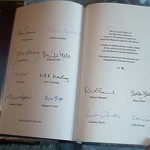Bernard Cornwell, Sharpe’s Trafalgar
£60.00
The author of the swashbuckling Sharpe series of adventures fighting the French during the Napoleonic Wars, Bernard Cornwell is a premier writer of historical military adventures. This is one of only 99 numbered and signed copies in a special binding with an appreciation by the most famous fantasy writer in Britain Terry Pratchett.
Out of Stock

 Bernard Cornwell is the most prolific and best known author of historical adventure stories of his generation. His work is in the tradition of historical adventure established by G A Henty, C S Forester and his near contemporary George MacDonald Fraser. More than one critic has noted that the Sharpe adventures are like Hornblower on land. Richard Sharpe is a ranker and he uses his wit and charm to occasionally move in the higher echelons of society – much as a private detective does in say the Raymond Chandler mystery novels and his successors. This device allows Sharpe and his sidekick Harper to a kind of detective duo, to find things out, have some influence and to make alliances when favours need to repaid. But it is not just the machinations behind the scenes that Cornwell’s books are famous for; it is the action and rough and tumble on the battlefield (or sailing ship) that gets the adrenalin going.
Bernard Cornwell is the most prolific and best known author of historical adventure stories of his generation. His work is in the tradition of historical adventure established by G A Henty, C S Forester and his near contemporary George MacDonald Fraser. More than one critic has noted that the Sharpe adventures are like Hornblower on land. Richard Sharpe is a ranker and he uses his wit and charm to occasionally move in the higher echelons of society – much as a private detective does in say the Raymond Chandler mystery novels and his successors. This device allows Sharpe and his sidekick Harper to a kind of detective duo, to find things out, have some influence and to make alliances when favours need to repaid. But it is not just the machinations behind the scenes that Cornwell’s books are famous for; it is the action and rough and tumble on the battlefield (or sailing ship) that gets the adrenalin going.
Bernard Cornwell has written 21 books with Richard Sharpe and his colleagues serving against the French. Sharpe has become a hero figure and the Sharpe Appreciation Society frequently has many hundreds in attendance at its annual convention. This  Scorpion Press edition contains an appreciation by the renown fantasy writer Terry Pratchett. The book sold out on publication.
Scorpion Press edition contains an appreciation by the renown fantasy writer Terry Pratchett. The book sold out on publication.
Plotline: Sharpe has to go home from India, and he would have left in 1805 and Cape Trafalgar lies on his way home, so why should he not be there at the right time? The greatest difficulty in writing this book was engineering the plot so that Sharpe could be on board a fighting ship of the Royal Navy (he would have sailed home in an East Indiaman, a merchant ship), but once that was solved Sharpe could give a capable hand in this, the greatest of all sea battles fought under sail.

 Bernard Cornwell, Sharpe’s Prey
Bernard Cornwell, Sharpe’s Prey
 Anthology: The Detection Collection (edited by S. Brett) – 12 signatures
Anthology: The Detection Collection (edited by S. Brett) – 12 signatures

Rating by Sir Terry Pratchett on May 8, 2012 :
From the Appreciation by Sir Terry Pratchett
I am not personally able to comment on Bernard Cornwell’s knowledge of the stink of the black powder or the taste of the cartridges, any more, I suspect, than are most of his readers. I know he gets it right, though. If he was not getting it right his time would by now simply be taken up in answering those arch ‘if only you’d had the good sense to seek my advice’ letters from people who care passionately about these things, and since he is still seen around and about this clearly is not the case. A man who will tell you about the different sounds a roundshot will make according to the height it passes overhead — a whipcrack when it’s low, and ‘a rumbling like a cask being rolled over floorboards’ when it’s higher — is a man who is “confident”. Sharpe brought to vivid life for me the sheer daily slog that underpinned those great campaigns, presented to us in all its hungry, grubby glory. I have an ancient book of battles in which every battlefield is an inky map covered with neat arrows and rectangles. Sharpe reminds us that these were men, frightened, desperate, not always well led and dying deaths quite as horrible as those our more technological century has devised. Often in fact as well as fiction the unregarded actions of even one unimportant man became the pivot on which history turned. And fights were not a glamorous clashing of swords, but a heaving breathless struggle to kill the enemy by any means available. Television is not good at getting this across, horse entrails not going down well even after the watershed. We cheer on Sharpe. He has a kind of angry courage, an inability to stay away from a fight, and a permanent inner battle between his inclinations and his sense of duty. Wellington wound up a dangerous spring on the day he raised Sergeant Sharpe from the ranks. It’s our magnificent gain”.
Rating by Mike on “Goodreads” on May 8, 2012 :
Cornwell, in his Historical Note, claims that “Sharpe had no business being at Trafalgar”- but I’m so glad he was! Cornwell evokes the thunder, smoke, and blood of a battle at sea as expertly as he portrays the clashes of huge armies on land. Sharpe is, as usual, right in the thick of things: even chatting with Lord Nelson before the battle. Although only the fourth tale, chronologically, in Sharpe’s saga, this one wasn’t published until 2001, shortly after the death of Patrick O’Brian. I assume this is Cornwell’s homage to O’Brian, with whom Cornwell is often compared. As a writer, I still prefer O’Brian- Cornwell can’t match O’Brian’s use of language or depth of characterization- but the Sharpe novels are enormous fun, and very satisfying on a visceral level. I wish, however, that O’Brian had included the sort of “Historical Notes” that Cornwell tacks on to the end of all of his books, explaining his research and narrative choices. Sharpe- or Cornwell- has yet to disappoint”. Mike on Goodreads